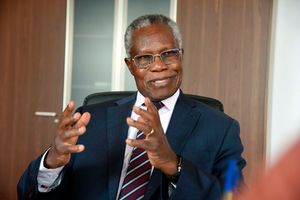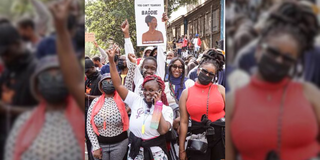
Gen Z protesters who showed up to the anti-finance bill 2024
As thousands of Kenyans took to the streets in defiance of the proposed Finance Bill in 2024, a new battleground emerged: social media. Here, public figures—musicians, actors, influencers—were being called to account not just for their art or image, but for their silence or support in a moment of national reckoning.
The Finance Bill 2024 sparked one of the most widespread and youth-driven protest movements in recent Kenyan history. Fuelled by frustration over taxation proposals, youth unemployment, and political exclusion, Gen Z activists dominated online and offline spaces with the rallying cry: #RejectFinanceBill2024.
As images of tear-gassed protesters, reports of abductions, and the confirmed deaths of demonstrators like Rex Masai, the public turned an accusatory eye toward celebrities—the silence of some had been deafening.
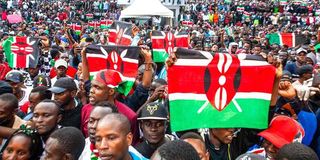
Participants during the Shujaaz Memorial concert held on July 7, 2024 at Uhuru Park in Nairobi.
The likes of Janet Mbugua, Mike Muchiri, Crazy Kennar, Octopizzo, Njerae, Nyokabi Macharia, Justine Wanda, Amina Abdi Rabar, Pascal Tokodi, Wanjiku Stephens, Abel Mutua, King Kaka, Bien and Fancy Fingers took a clear stand against the bill and the violence that followed.
Lupita Nyong’o, the Kenyan Hollywood actress, used her international platform to condemn the use of force against peaceful protesters. She posted on X (formerly Twitter), “Democracy dies in silence. We cannot remain silent as our youth are tear-gassed and abducted for speaking truth to power.”
Also Read: Gen Z: The generation that redefined Kenya
Juliani, musician and activist, echoed sentiments of solidarity with protesters. “The Finance Bill is not just about tax; it’s about whose voices matter,” he wrote.
These voices provided validation and visibility to a movement driven by ordinary Kenyans, many of whom felt their lives were disregarded by both their government and their role models since, on the other hand, many celebrities who had enjoyed massive public support up until then had kept mum.
Especially those with massive online followings—remained conspicuously silent. Critics pointed fingers at influencers such as Kate Actress (Catherine Kamau), Eddie Butita, Sharon Mundia, and Michelle Ntalami, accusing them of ignoring or downplaying the protests. Some were even accused of aligning with state-sponsored narratives or avoiding political commentary to protect brand deals.

Youths take part at the Uhuru Park grounds in Nairobi County on Sunday, July 7, 2024 during the Gen Z Memorial concert honour of those killed during anti-tax protests over the last three weeks. DENNIS ONSONGO|NATION
Andrew Kibe, never one to mince words, blasted celebrities on his podcast for what he called “strategic silence,” saying: “When Kenya is bleeding, they’re posting vacation pics and product placements. You are either with the people or with the oppressors.”
In a generation where social capital can influence elections and social change, the expectation for public figures to wield their platforms for justice has never been higher.
Other celebrities rose up from the activism that ensued. Nelson Amenya, Law Society of Kenya (LSK) president Faith Odhiambo, Shakira Wafula, Hanifa, Joshua Okayo and Wanjira have become the faces of a new kind of fame to a generation that just a year ago were said to be detached from the real world happenings.
Albert Ojwang: A turning point
For long, the fire of maandamano had quieted down due to the well-documented series of forced disappearances or abductions of loud and very visible government critics, especially the very young ones on social media spaces.
A very valid feeling of fear overcame the populace, who, though still defiant, were cautious about how they either framed their messages or whom they critiqued for government mishaps.
However, the recent death of Albert Ojwang, the teacher who was picked up by DCI officers in Homa Bay before being brought to Nairobi and killed within a few hours of his alleged arrest, caught the ire of the public. His body was found bearing signs of torture and he became a symbol of state brutality.
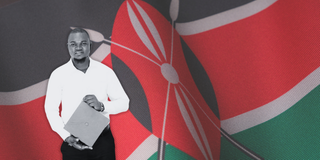
The mysterious death of teacher Albert Ojwang in a police cell has sparked widespread national outrage.
For close to a year, the fear of the unknown had quelled somewhat the fire of defiance and truth-speaking to authority. However, Ojwang’s death proved that the police were indeed involved and that staying fearful wouldn’t guarantee you safety. After all, Albert Ojwang’ had complied with the authorities once they came to pick him up at his father’s house. And according to his own words while on call with a friend this was to be the first time he would be locked up in a cell.
From the turnout during the march for #JusticeForAlbert, and the condemnation of the police actions, inactions and the politicians showing their hands in the inclusion of goons to scatter and discredit protesters, it is clear that we are pretty much hands on deck.
Celebrities are not elected leaders. But in today’s media-saturated world, they shape public discourse. In Kenya, where social media has become both a lifeline and a loudspeaker for civic engagement, the expectation for celebrities to speak truth to power is growing.
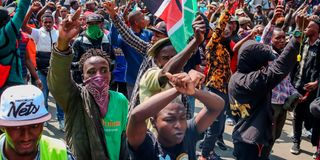
Anti-government protesters march along Moi Avenue in Nairobi on July 23, 2024.
As videos of the terrifying events of Wednesday were streaming on social media, Natalie Tewa questioned whether we even have a government anymore since things are only getting worse and it seems like leadership wasn’t stepping in to calm the unrest nor address the needs of Kenyans.
“Meanwhile, our ‘president’ keeps talking about he’s ‘on a mission to transform the country’ when he can’t even rein in those meant to protect Kenyans. Clearly, those in power are just doing whatever they want without consequences - of course because that’s the culture that’s been set - killing people has become completely normal. What a sad state of affairs,” wrote the lifestyle influencer in her story.
She added that in her travels to Rwanda, she has come to admire how efficiently their government operates even though there’s a significant gap between the government’s pace and the skills or capacity of the people. While in Kenya, we have a huge population of highly-skilled, educated individuals who remain unemployed and oppressed by a government that’s making it so difficult for anyone to earn a living.
Celebrities like Ivannoh, Mbogi Genje, Miss Katiwa and many others from “the ghettos” spoke directly to the youth from the area who were allegedly paid Sh2,000 by politicians- as some of them mentioned ODM leadership and Nairobi Governor Sakaja in videos as their benefactors — to not allow themselves to be used for peanuts to risk their lives but instead look at the bigger picture which is good governance; which will benefit them even more.
It seems like the message from the fans last year that stature, fame or work doesn’t justify you not taking a stand has made more celebrities use their platforms to stand with Kenyans in the fight for a better future.




